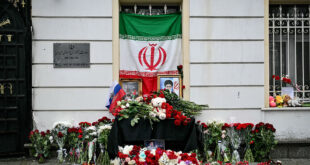BAGHDAD (AFP) — US troop losses in Iraq topped 3,500 after a bridge bombing near Baghdad on Monday, as Britain’s visiting future prime minister rejected domestic calls for a probe into the war’s failings.Three US soldiers were killed and six wounded when their checkpoint was struck by a suicide car bomb, the military said, bringing the overall death toll to at least 3,501 since the March 2003 invasion, according to an AFP count based on Pentagon figures. But despite the passing of yet another grim milestone for coalition forces, Britain’s Gordon Brown, who takes over from Prime Minister Tony Blair on June 27, said it was not the time for an inquiry into the war as called for by the Conservative opposition.
“The wrong time to even consider an inquiry is when you have got to give all your effort to supporting the troops on the ground,” Brown told Sky News.
“There are times to consider these things, but the right thing to do at the moment is to give the full support and the full force of government behind the troops on the ground.” Speaking to reporters in Baghdad, however, he acknowledged things could have been done differently. “I think it’s important to learn all the lessons, just as Tony Blair has said he acted in good faith but mistakes were made,” Brown said during his first visit to Iraq since he was chosen by the Labour Party as Blair’s heir.
Monday’s attack brought to 28 the number of US troops killed in Iraq so far this month, with more than 25,000 US troops wounded in combat since the invasion.
An interpreter was also wounded in the bombing, which destroyed part of a highway overpass in Mahmoudiyah, a town south of Baghdad in a violent agricultural region known as an insurgent stronghold dubbed the “Triangle of Death”.
The highway was partly blocked by debris from the collapsed bridge and the military said an engineering unit was dispatched with bulldozers and other heavy equipment to clear the road.
Last month, three US soldiers were snatched during an insurgent ambush on a small unit manning a temporary observation post near Mahmudiyah, during which four US soldiers and an Iraqi interpreter were killed.
Al Qaeda front group said a week ago it had killed the captured troops, an act Human Rights Watch said would constitute a violation of international humanitarian law and that those responsible would be guilty of war crimes.
Meanwhile, Brown, currently Britain’s finance minister, held talks with Iraqi leaders including Prime Minister Nouri Maliki and President Jalal Talabani.
It was Brown’s second visit to Iraq but his first since he was chosen to replace Blair in late June, and came amid mounting pressure at home over the war.
Brown has not indicated any plans to radically change Britain’s policy on Iraq and on Monday vowed that London will continue to support the beleaguered government, Talabani’s office said.
Talks also focused on “the role of British forces to build and rehabilitate Iraqi military’s abilities and participation in delivering peace and stability in southern Iraq” where British troops are based, Talabani’s office said in a statement.
About 150 British troops have been killed in Iraq. The government has pledged to withdraw this year about 1,600 troops from a force of 7,100 soldiers deployed in Iraq.
Britain has in the past year been increasing its deployment of soldiers to Afghanistan, where they are fighting a resurgent Taleban, while pledging to reduce troops in Iraq.
Violence continued in Iraq on Monday with at least five people killed, including a senior central bank official.
Khair Deen Sabri Ahmed, the bank’s general manager in the northern Nineveh province, was shot dead by insurgents in the provincial capital of Mosul while on his way to work, said police Brigadier General Mohammad Waggaa.
His two bodyguards were also gunned down, and two other people were killed elsewhere.
A car bomb attack in the restive city of Baqouba, northeast of Baghdad, on Monday led to the collapse of a key bridge, but no other details were immediately available, police said.
On the domestic political front, Iraq’s parliament voted to oust its outspoken Sunni Speaker Mahmoud Mashhadani after he allegedly ordered his bodyguards to beat up a Shiite MP.
 Eurasia Press & News
Eurasia Press & News



